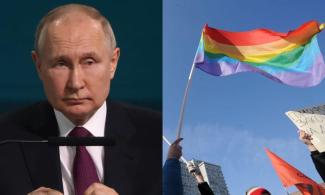
People can also no longer freely change their sex on IDs and other documents.
Russian President, Vladimir Putin, on Monday signed a bill banning sex reassignment surgeries into law.
The legislation, aimed at tighter regulation of what Members of Parliament described as the “transgender industry,” bans legal sex changes and medical interventions associated with transitioning except due to serious medical grounds, RT reports.
Administration of drugs and surgeries associated with gender reassignment therapy will now only be permitted in cases that require treatment of reproductive organ deformities in children. Only licensed clinics linked to the Russian Health Ministry can now make decisions on such treatments and issue relevant certificates, the legislation says.
People can also no longer freely change their sex on IDs and other documents. Those who did so may not adopt children under the new law. Married couples can also have their marriages declared invalid if one of the spouses changes their sex.
According to Russian Deputy Health Minister Evgenia Kotova, over 2,000 people legally changed their sex in the country between 2018 and 2022, when the practice was legal.
State Duma Speaker Vyacheslav Volodin blasted what he called the Western transgender industry as he defended the reasoning behind the law. The number of gender reassignment surgeries in the US has increased by 50 times over the past 10 years, he said, adding that around 1.4% of all US teenagers aged between 13 and 17 identified themselves as transgender in 2022.
“This is the path leading to the degradation of a nation,” he said, stating that the newly adopted law was designed to avoid such a scenario.
The legislation still allows for the treatment of relevant diseases. “There are conditions that can be identified during childhood,” he said. “Yet, when a person changes sex because they woke up in the morning and decided they are not a boy but a girl, that is just wrong,” the Duma head explained.
According to the top Russian senator, Valentina Matvienko, the law has received “many positive responses from European nations.”
Trans rights activists still blasted the law, arguing that it seriously diminishes the rights of transgender persons in Russia. Critics also claimed that the legislation’s wording creates uncertainty related to treatment of certain diseases not linked to gender reassignment procedures, like mastectomy for women genetically predisposed to breast cancer.
Kremlin spokesman Dmitry Peskov said on Monday that all such issues had been reviewed by experts while the bill’s text was still being debated in parliament. “All those questions were answered,” he said, adding that risks associated with the law had been minimized.